Femme Filmmakers Festival 2022: Competition Shorts, Days 7–10

Film critic, Ithaca College and University of St Andrews graduate,…
Femme Filmmakers Festival 2022 drew to a close this October, concluding its seventh year. The online festival is run by Filmotomy and partnering with MUBI, In Their Own League, and InSession Film and comprises a showcase selection and a feature films section for all 10 days. Its competition selection for 2022 comprises 20 short films, which, like all films at the fest, are directed by women, and which show for days one through nine. This year, in 2022, the festival ran from Sept. 23 to Oct. 2.
Days one through three and four through six saw a selection of great short films. The final days of competition for FFF7 brought several French-Canadian shorts, from a Christmas story to date in a cemetery, as well as a Portuguese-language short about the burning Amazon rainforest, an Argentine music video, a queer American meet-cute, a Belgian story of highs and lows, and a Cappadocian coming-of-age story. Some of them are available to watch online.
Like the Ones I Used to Know (Annie St-Pierre)
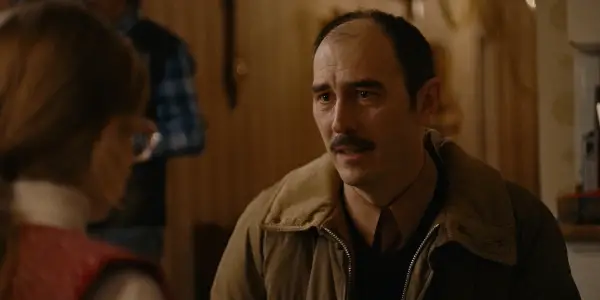
Divorced dads can’t catch a break. In the Canadian French-language short Like the Ones I Used to Know, whose title is referencing the “White Christmas” lyrics, Denis’ Christmas Eve keeps getting worse and worse. We’re introduced to him sitting outside a house party in his truck, impatient and nervous, actor Steve Laplante’s beleaguered face and hangdog mustache giving serious John Cazale vibes.
Inside the house, his children — Mathieu (Laurent Lemaire) and Julie (Lilou Roy-Lanouette) — are pissing in a sink and a bathtub and waiting loudly for Santa Claus. That makes this short initially feel like a grungy suburban drama, sharing the grit and family febrility of kitchen-sink tragedies like Samuel Kishi’s Los lobos or Ken Loach’s Sorry We Missed You — but the short then throws out a welcome right turn that takes the focus off the children and places it onto the unwilling shoulders of the more sensitive, complex Denis.
The surprise twist in Like the Ones I Used to Know is how much it leans into its Christmas setting. Not that the characters embody a particularly Christmas-y compassion — for the most part, they’re happy to drink and make small talk yet aren’t in the least interested in poor Denis. He shows up to collect his kids — only they won’t go with him, at first upset because Santa hadn’t come yet, but the reason proves to be much deeper and more psychological.
Soon, Mathieu is hiding in the freezer to avoid having to sleep at his dad’s house. And Dad, hopeless and hapless, putters about the living room while the kids’ mother (Larissa Corriveau) rounds them up. In one magical scene, Denis busts out a carol on the keyboard, and for a minute, the short completely mesmerizes.
Verisimilitude be damned, but the lighting drops out, save for a warm golden spotlight on Denis. His wavering singing is joined by a loud drunken chorus from the other partygoers. He sees Julie standing across the room, and Étienne Roussy’s camera pushes in slowly on each of them. Then Denis loses the tempo, speeds up his singing to get the song over with, and rushes to his daughter, and the moment dissolves, like a melting snowflake.
Director Annie St-Pierre, who scripts the film also and co-wrote the story with Daniel I. Schachter, beautifully captures this fraught domestic holiday drama, lushly lensed by Roussy. The overall look is very 1970s — it’s hard to tell if the earthy tones, hairstyles, characters smoking indoors, and Denis’ Cazale ’stache are intentionally representing the era, or if this is just what Canada is like all the time (I have never been) — but this vibe nevertheless exudes texture and history, like the musky smell of cigarettes left on a leather couch. No doubt St-Pierre and Roussy are to thank for that creative direction, alongside art director Eric Barbeau, costume designer Gabrielle Lauzier, hair stylists Josianne Cournoyer and Andie Wisdom Dawson, and makeup artist Léonie Lévesque.
St-Pierre has been directing since 2003, and Like the Ones I Used to Know is her sixth project. She featured in the bonkers 2019 Canadian film The Twentieth Century and previously directed a tongue-in-cheek, reverential short, Jean-Marc Vallée, which not only rocks; it’s also free to watch online.
Laplante won the festival’s award for best male performance. Like the Ones I Used to Know is available to watch online for free courtesy of The New Yorker.
Laundry Day (Rose Knopper)
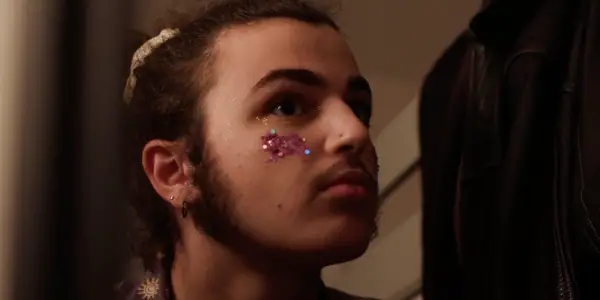
Lucas raises glitter to their cheeks, their eyes, and looks at themselves in the mirror, smiling. Their dress for their night out, though, has a prominent stain — cut to: a laundry machine, spin cycle.
Laundry Day, directed by Rose Knopper, is a slice-of-life queer drama dripping with authenticity and creased with understatement. We don’t learn much about Lucas — Lennie Manioudakis invests the character with pathos and sincerity, a rock who is used to water washing over them. (Manioudakis and Knopper wrote the script.)
Targeted prejudice by two dudes in the laundromat, Andre (Sam Arthur) and Zach (Ali Raza), doesn’t seem to bug Lucas, implying a whole history to the character we never get to see. Lingering shots of Lucas studying themselves in the mirror or casually loading up their laundry conjure thoughts of other slice-of-life queer and trans stories, like Sean Baker’s Tangerine, which also has a laundromat scene, or Isabel Sandoval’s gorgeous and sensual Lingua Franca. Laundry Day shares their avoidance of spectacle or high drama in favor of sincere conflict and guileless charm.
Arthur’s character, Andre, speaks to Lucas after Zach leaves, and he apologizes for his friend’s comments. The two sit on a bench outside the laundromat, and Lucas smokes weed. The handheld camerawork in this scene and throughout — the film is shot by Winona Lu — reveals the drifting uncertainty of an early queer encounter for Andre, as he bumbles through chitchat with the suave and unaffected Lucas and then reaches for their hand.
The credits tell us that this is based on a real experience, but the power of Laundry Day is that this could be anywhere, in any city, at any time. It’s generalized enough to be universal, and whether it’s based on real events isn’t of enormous consequence due to the limited scope and innocuous tone of the picture. The film also bears the burden of having to pack in so much — this is a queer meet-cute, after all — while also feeling like it could have cut two minutes and presented a more compact, lean story. The American short, though, uses its five-minute runtime to present a gentle, unhurried, and unexpectedly eventful laundry trip for Lucas — one brimming with promise, for not just Lucas, but for writer-director Knopper as well.
Laundry Day is available to watch for free on the FFF7 website.
Down from the Clouds (Cansu Boğuşlu)
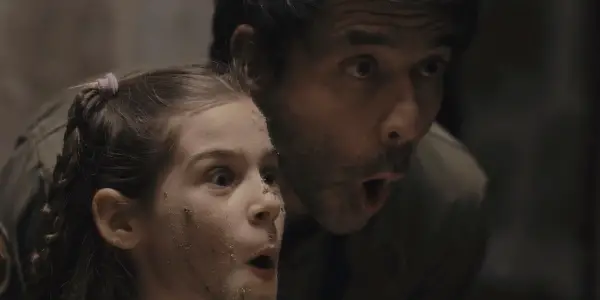
“Love is giving someone the power to destroy you and trusting them not to,” the opening title card to Down from the Clouds reads. Director Cansu Boğuşlu’s short film Down from the Clouds pairs nicely with Like the Ones I Used to Know — both are about families in crisis with focus landing on the relationship between fathers and daughters.
I feel like film dramas don’t often study that dynamic. When’s the last time you’ve seen a film about a daughter dealing with the emotional damage from her dad being a prick, or the fallout from her dad leaving? That Sofia Coppola movie On the Rocks from a few years ago? At FFF7, we get not one but two short, practically right next to each other, dedicated to interrogating fraught father-daughter relationships in childhood. And while the characters in Annie St-Pierre’s Christmas short manage to make amends and drive off with the potential to nurture a more loving relationship, Down from the Clouds unapologetically represents a relationship rotten at its core.
The Turkish short begins ominously by showing a mother, Anne (Özlem Conker), and her daughter, Su (Lavinya Ünlüer), listening to the news. Çilem Doğan, we are told, allegedly murdered her husband, who had been abusing her. (Doğan is a real person, and she was sent to jail in 2021. She alleged her husband had also forced her into sex work.) Something about the report doesn’t sit right with Anne, and once her husband, Levent (Cansel Elçin), returns, we understand.
He’s drunk, but he’s also boisterous, mock-heroic, and exudes Bobby Cannavale levels of charming deadbeat charisma. It’s easy to see why Su, who doesn’t see through that veneer like her mom does, is intoxicated by him. She begs Baba to take her out for ice cream, and so they go, though it’s very late and nowhere but bars will be open. Conker’s desperation in this scene is flooring, as she tries to get Levent to come back into the house and chases them out to his car — but of course, Baba goes anyway.
Written by Boğuşlu along with Ali Mahir Aksu and Irem Güler, Down from the Clouds whistles and churns with a crescendoing intensity. The trajectory of the short, as father and daughter drive through across snowy Cappadocia to a bar, is both tragic and promising. Since the film is focused on the cathexis Su invests in the image of her father, we hope the film resolves with Su seeing the truth: that he’s actually a selfish, destructive alcoholic.
The scene in the bar is incredibly stressful, edited to precision by Mustafa Koca in a way that highlight’s Baba’s drunkenness and Su’s discomfort. And the short is immaculately lensed by Szymon Kuriata — a late transition to drone photography notwithstanding — and captures both the intimacy of the drama but also the dwarfing glory of the landscape, which is the same region where Nuri Bilge Ceylan’s Winter Sleep was filmed. (Boğuşlu’s film is dedicated to “magical Cappadocia and its people.”)
Doğan’s case — the one that’s teased on the news report — is not just about a woman exacting justice against her alleged abuser. It’s about the stories we tell, and how those stories craft gender expectations: “Why should women always die? It is time that men died instead!” she said on her way to the police station. The ending of Down from the Clouds, depicting Su running off through a field of hot air balloons in the beautiful Anatolian countryside, beautifully depicts a young woman running off on her own, into the rest of her life.
Down from the Clouds won the festival awards for directing and cinematography, tied with On My Way for both prizes.
Cemetery (Sophie B. Jacques)
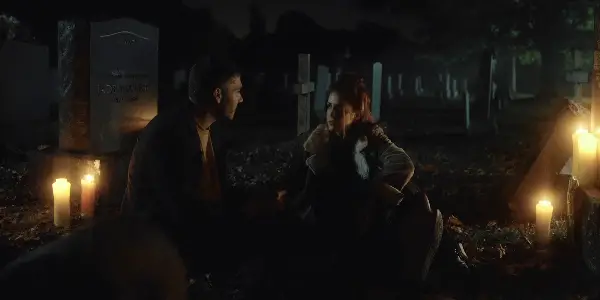
After eight days of FFF7, we finally have our first “genre” short. Cemetery has all the hallmarks of an old-school spooky short film: a cemetery at night, deep swirls of fog, ghosts, creepy candles, and a mysterious robed figure in black.
In the film’s first shots, Jade (Sophie B. Jacques) and Simon (Jason Roy Léveillée) slip into Hillcrest Cemetery, jumping the fence and making their way to a particular gravestone for a candlelit date. (I wish someone would take me on a cemetery date!) Their relationship is beautiful, with clever and whimsical writing from Jacques, who also directs. (The film also features a cameo from Marianne Farley, who directed Frimas earlier in the festival, on day four.)
The couple muses about how they’d like to die, and Simon makes a discovery about Jade — she’s actually dead, and it’s her grave they’re sitting on, drinking. Refreshingly, the ghosts in Cemetery are calm, not frightening, and physical rather than ethereal, as they are in the Japanese horror classic Kuroneko or the French-Canadian indie film Ghost Town Anthology. There’s more mystery than macabre about Jade, who wants Simon to talk to her best friend for her to put her soul to rest.
The 10-minute French-Canadian short is moving and brief, expertly wound like a watch so that the revelation clicks into place at exactly the right moment, at just the right slow, uncertain pace. Jacques, who won three prizes at the festival previously for her short film Foyer, crafts a crisp, spooky atmosphere from this sparkling two-person show, with her creative team — cinematographer Jérome Hof, sound designer Francis Gauthier, and editor Isabelle Levesque — teasing out the romance and suspense of the premise and setting, a pitch-perfect example of making more out of less, of converting a 17-hour shoot in a cemetery into an effective, perspicacious, gripping short film.
August Sky (Jasmin Tenucci)
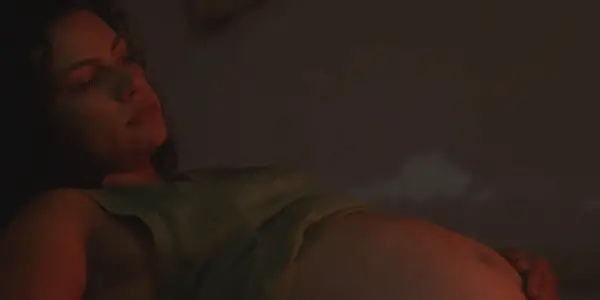
The Portuguese-language short August Sky transpires at a very specific moment in history. The Brazilian short film occupies the small window when news headlines were between the Amazon rainforest burning down and the oncoming coronavirus disease. Over the course of the short, the smoke blocks out the sun, and day turns to night. But at the center of the drama is a nurse in São Paulo, Lúcia (Badu Morais), too busy dealing with her pregnancy, her demanding job, and her grandmother to worry about the world falling apart around her.
Director and writer Jasmin Tenucci — along with co-writer Saim Sadiq — directs the story’s flow with grace, slowly lowering us into the chaos hinted at by the first shot, of smoke billowing up from the trees. Tenucci has written for Brazilian television since 2010 and directed three other shorts. August Sky opened at Cannes in 2021, its reception no doubt enhanced by that the burning rainforest was horrifying and traumatic enough to imprint itself in the heads of so many, and the decision to set Lúcia’s drama against that blacked-out sky adds a completely new dimension to the environmental apocalypse. Suddenly, the pregnant Lúcia becomes a window into a country with an uncertain future. Silhouetted against the fire in the sky in August 2019, Lúcia evokes a nation condemned by a far-right leader all too eager to let the Amazon be bulldozed and put indigenous communities at risk.
Yet there’s hope in August Sky, as Lúcia delivers food to her grandma’s neo-Pentecostal church, meets a woman there who intrigues her, and begins going regularly. Each scene in the church crackles with vibrancy and shines under Bruno Tiezzi’s clever cinematography and Tenucci’s elegant staging. For instance, we rarely see anyone’s face in church — especially in the first scene set there, it’s all hands, bodies, and objects. In future compositions, Tiezzi frames his shots through crowds, leading to Lúcia and the other woman in the congregation, who share glances and are the only two characters in the church whom we see face the camera.
There’s hope not only in the community Lúcia finds in church, but also in her relationship with this other woman. LGBTQ+ rights in Brazil are among the most protective in South America — despite President Jair Bolsonaro’s homophobia and threats against queer people, São Paulo hosts the largest gay pride parade in the world. The relationship between Lúcia and this other woman is all glances and small talk — but then again, so is, like, every queer relationship at first. One wishes that, if the filmmakers were trying to go in an LGBTQ+ direction with their characters, they would have been more explicit, given that Brazil (for the time being) has a leader who thinks gay people should be beaten in the street.
Tenucci’s short ends with the sky turning orange as smoke from the burning rainforest chokes out the sun. Seeing it, Lúcia decides to walk to the hospital for an ultrasound. Our penultimate shot is of Lúcia in church again, holding hands aloft in prayer with her potentially platonic church buddy, and then we hold on Lúcia’s face — eyes red, on the verge of tears, looking to the sky, while we hear fire crackling somewhere.
August Sky won the Red Lantern (Film Second Prize) at the festival.
Gold Plated (Chloé Leonil)
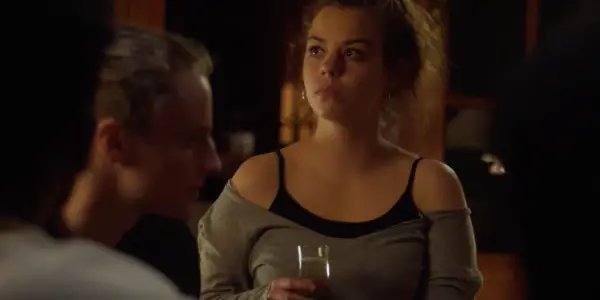
Inès (Salomé Dewaels) wants to be a Deliveroo cyclist. It’s not a good job, the pay is poor, and worst of all, she needs her own bike. Hard on money and with a mother (Nade Dieu) who can’t spare a euro, Inès has to rely on her own scrappiness and willpower.
Through Inès, Chloé Leonil’s Gold Plated is a bittersweet coming-of-age story, a stressful 25-minute French-language short about a down-on-her-luck kid growing up in Brussels and struggling to make sense of things as her world snaps into perspective. She’s playing basketball with some school friends when she spots a bicycle in a tree. Eager to get her hands on a new bike and get a job, she tries to wedge it out. But it actually belongs to Martin (Noé Englebert), a nice rich kid who immediately invites Inès to a party at his.
Leonil’s short film is a slow burn as Inès finds herself up against the edges of a box that was built for her when she was born. Perhaps that’s the poignancy of the 1.33:1 aspect ratio — that, and it signals simpler, more innocent times. The cinematographer is Mathilde Blanc, who mostly has credits on short films alongside a video technician role for the Baby Annette doll in Annette. Blanc and Leonil bring a warm glow to Gold Plated, which makes us think of summer days as Inès bikes through Brussels and of claustrophobic dinginess and disease when she’s trapped at a party drinking champagne with the rich kids.
There’s a line in Akira Kurosawa’s High and Low where the medical intern-turned-kidnapper (Tsutomu Yamazaki) says to his wealthy mark, “I do know my room was so cold in winter and so hot in summer I couldn’t sleep. Your house looked like heaven, high up there. That’s how I began to hate you.” That sentiment is at the heart of so many of these culture-clash kitchen-sink dramas, and Inès very quickly realizes that she has little to gain from her surface-level friendships with the rich kids. They’re good for a surfeit of comfort and champagne but precious little Inès can take with her outside Martin’s house.
The short becomes quite dour — in its focus on Inès and her struggle to break free of her circumstances, Gold Plated becomes dim and grim. One affecting scene sees the rich posse order delivery, and Inès watches from the second-floor window as a Deliveroo cyclist slowly lifts his bag onto his back once more and mounts his bike to ride off into the night. At least Inès gets a bike in the end.
Dewaels won the festival prize for best female performance. Gold Plated is free to watch online on Vimeo.
When It Comes From the Earth (Katalin Egely)

The final short of the competition at the festival is another music video. But unlike “Ten Degrees of Strange,” the short “When It Comes From the Earth” is a 2D-animated work comprising mostly felt and cutout animation. Animator Katalin Egely, a Hungarian filmmaker for whom this marks her third year with the Femme Filmmakers Festival, crafts a buoyant, vivacious cultural fruit salad. Her animation finds a range of expression — with fun touches like depth of field and more stimulating shots, like a spiral snake swirling on-screen — that brings life to the music.
As for the music, from Argentine group Canticuénticos, the group specializes in children’s songs rooted in Argentine and Latin American culture. “When It Comes From the Earth” is about healthy eating, and if it just stopped there, it’d feel didactic and homiletic. Children are quite good at intuitive eating, and more of them would grow up to be well-adjusted if we stopped imposing moralistic values on their food choices. Thankfully, especially in the latter half of the song, Canticuénticos intermingles cultural values to express Argentine pride: “Our land is our home and it feeds us very well,” they sing in Spanish. The Argentine folk perspective adds depth to the portrayal of the Earth’s nurturing role for children. Between this and August Sky, South America has a strong cultural presence in the back four days of the festival.
Egely’s animation is certainly the element worth recommending here. I’m a sucker for when you can see the process — some of my friends in film school did stop-motion animation, and I know how laborious and time-intensive the work is — and in “When It Comes From the Earth,” you can see the little blurred borders for the moving parts, or the shadow some cutouts have as they’re lifted above the board. Pieces like a girl’s hands and feet have visible texture, a scrunchy kind of cardboard grain, that makes the short feel homespun, wholesome, and rustic.
“When It Comes From the Earth” won awards for mixed media and music. The short is available to watch for free on YouTube.
Conclusion:
As always, the competition selection was the major component of the festival for its final four days, but the shorts were also complemented by a showcase selection and several feature films each day, all directed by women. Molly Manning Walker’s short Good Thanks, You? showed on day seven, followed by Friends Like That from Francesca de Fusco on day eight, Love Is Just a Death Away from Bára Anna Stejskalová and Bod by Isabel Garrett on day nine, and day 10 concluded the showcase selection with a trio of shorts: Savannah O’Leary’s Gone Viral, JC Farris’ Assembly Line of Broken Hearts, and Emma Debany’s Alice in Somnia.
The feature films on day seven were Mia Hansen-Løve’s cinephilic Bergman Island and Karen Maine’s teen comedy Yes, God, Yes. Day eight featured Anne Fontaine’s 2016 French wartime drama The Innocents and Julia Hart’s superhero drama Fast Color. Day nine featured Alice Winocour’s Disorder, starring Matthias Schoenaerts, and Lynne Ramsay’s elegy on violence, You Were Never Really Here. The final day of the festival saw screenings of the 2021 French abortion drama Happening from Audrey Diwan alongside Ana Lily Amirpour’s Iranian vampire masterpiece A Girl Walks Home Alone at Night. Femme Filmmakers Festival 2022 concluded on Oct. 2, and the full list of festival prizes is available online.
Learn more about the Femme Filmmakers Festival and see their 2022 selection here.
Does content like this matter to you?
Become a Member and support film journalism. Unlock access to all of Film Inquiry`s great articles. Join a community of like-minded readers who are passionate about cinema - get access to our private members Network, give back to independent filmmakers, and more.
Film critic, Ithaca College and University of St Andrews graduate, head of the "Paddington 2" fan club.













